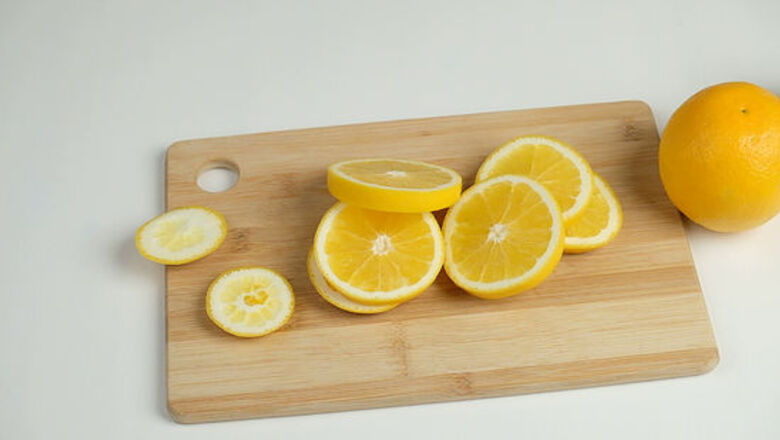
views
Cutting and Prepping Fresh Orange Slices

Cut the orange widthwise into 1 cm (0.39 in) slices. Consider the stem side the “North Pole” of the orange and orient it so it’s on its side. Carefully use a sharp kitchen knife to create even slices. Discard the first and last slices (the “North” and “South Poles”). For the best results, use ripe (but not over-ripe) oranges without bruises or blemishes.

Blot away any surface moisture with paper towels. Lay all the cut slices on a plate or tray, then dab them with a paper towel to soak up any surface moisture. Turn the slices over and repeat the process with another clean paper towel. This step isn’t absolutely necessary, but it will help the slices to dry out faster. Use plain white paper towels. Decorated paper towels can sometimes transfer colored spots onto the slices.
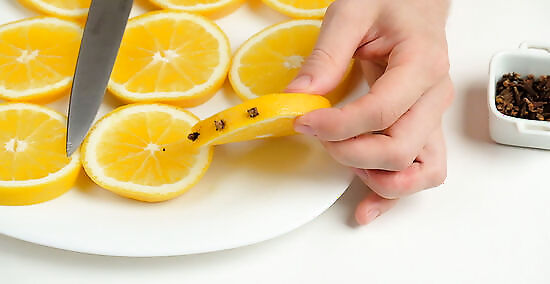
Spike the cut slices with cloves to make decorations. Use a knife tip to cut a small hole through each fresh orange slice, just inside the rings of pith and skin, so you can loop a string through each opening after the slices are dried. Press a clove, star side up, into the center of each orange slice. Then, if desired, create a ring of cloves around the inside perimeter of the slice. After the slices are dried, simply tie a colorful yarn or string through the hole in each slice so you can hang them. Dried orange slices decorated with cloves are a traditional Christmas tree and wreath ornament in the UK. You can skip the cloves if desired.
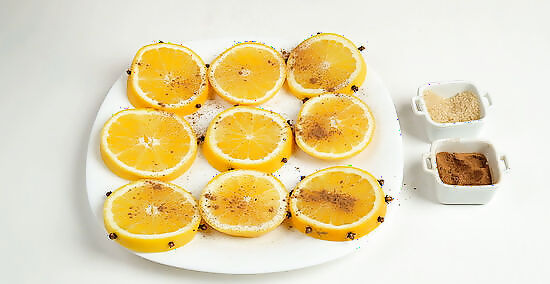
Sprinkle on seasonings to make a sweet treat out of the slices. Lay the fresh slices on a plate or tray, then sprinkle them with white sugar, brown sugar, or coconut sugar. Follow up with a dusting of cinnamon, ginger, or both. Or, try other spice combinations until you find your favorite! Once dried, the seasoned slices make a great snack or dessert garnish. If you want to use a slice as a drink garnish, cut a line in a fresh slice from the center through the skin on its perimeter. This will become a small wedge-shaped cutout once the slice is dried. Use seedless oranges for snacking, or pick the seeds out of the slices before drying them.
Drying in the Oven
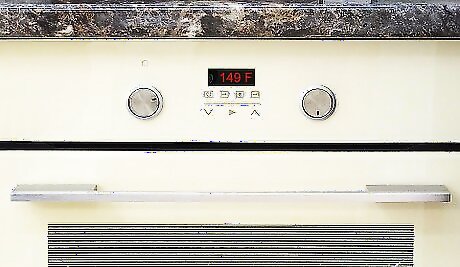
Set your oven at 65 °C (149 °F), or as low as possible. If your oven does not permit a setting this low, put it as low as it will go. At 65 °C (149 °F), it will usually take about 3.5-4.5 hours to dry the orange slices. At 95 °C (203 °F), it will typically take 2.5-3.5 hours. At 120 °C (248 °F), expect it to take 2-3 hours. Even though it takes longer, aim for the lowest temperature you can. This greatly reduces the chances of burning the slices instead of drying them.
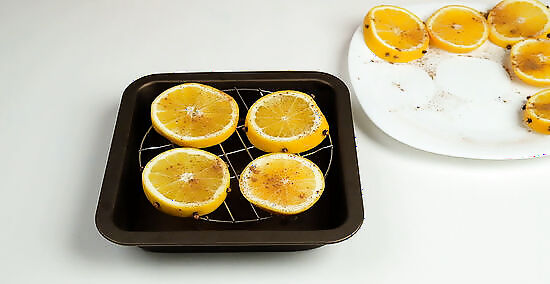
Space out the slices on an oven rack or another wire rack. Remove the oven rack from the preheating oven, or use an oven-safe wire rack. Lay out the slices on the rack so that they have at least 5 cm (2.0 in) of space on all sides. Spacing the slices out on a wire rack improves the air flow and decreases the drying time. Using a baking sheet may increase the drying time by up to double. If you do choose to use a baking sheet, line it with parchment paper so the slices don’t stick.
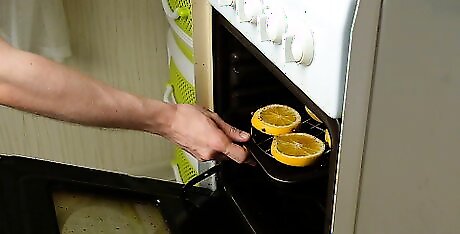
Put the rack in the oven and turn the slices every 30-45 minutes. Frequent turning helps keep the slices from sticking. It also reduces the chances of burning, especially if the oven is at a slightly higher temperature. Simply pull the tray from the oven and use tongs to flip the slices when it’s time to turn them.
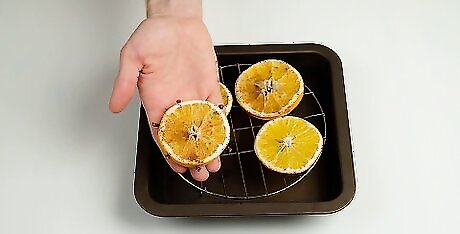
Let the slices cool on the rack when they look and feel dry. Pull the slices from the oven as soon as they look fully dried and feel dried out when you touch them with the tongs. Let them cool to the touch on the rack, then confirm with your fingers that they feel completely dried. It may take up to 30 minutes for the slices to cool to room temperature.
Utilizing Your Microwave

Sandwich your cut slices between 2 thick layers of paper towels. Place 5-6 white paper towels on the microwave tray or a microwave-safe plate. Lay 4-5 orange slices on top of the paper towels, making sure they each have 5 cm (2.0 in) of space all around. Cover the slices with 5-6 more sheets of white paper towels. Don’t use decorated paper towels, because they may transfer dyes to the orange slices. Dry the slices in batches if you have more than 4-5 to dry.
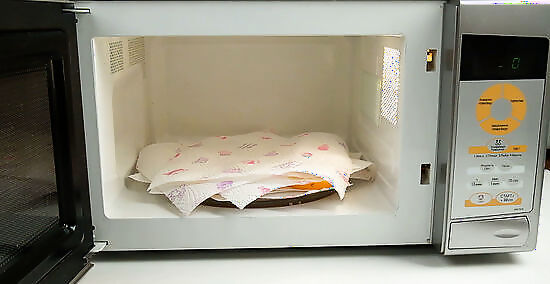
Microwave the covered slices at 50% power for 8 minutes. Don’t heat the slices at full power, or you’ll end up with burnt discs instead of dried rounds! Consult your microwave’s instruction manual if necessary. Use 50% power if your microwave is rated at 1000 watts or less. If it’s rated at greater than 1000 watts, set it at 40% or even 30% power. Every microwave is different, so plan on some trial-and-error in finding the ideal power level and heating time for your orange slices.
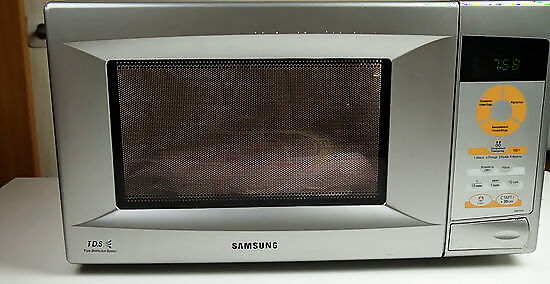
Replace the paper towels and repeat the drying process. After 8 minutes, remove the orange slices, flip them over, and sandwich them between layers of 5-6 fresh paper towels. Put them back in the microwave for another 8 minutes at 50% power (or less, depending on your model).
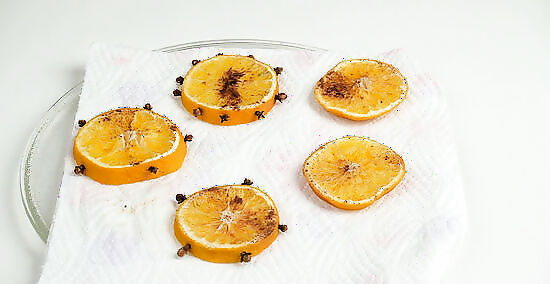
Stop microwaving the slices when they’re nearly fully dried. After 2, 3, or possibly even 4 rounds of microwaving, the orange slices should be almost completely dried out. They’ll never fully dry in the microwave without burning, so pull them at this point. Place them on a wire rack and give them 30-60 minutes to finish drying out. If it’s a humid day, you may want to finish drying the slices in the oven. Set it as low as possible—ideally, 65 °C (149 °F)—and heat the slices for about 30 minutes on a wire rack.
Using a Dehydrator or Natural Sunlight
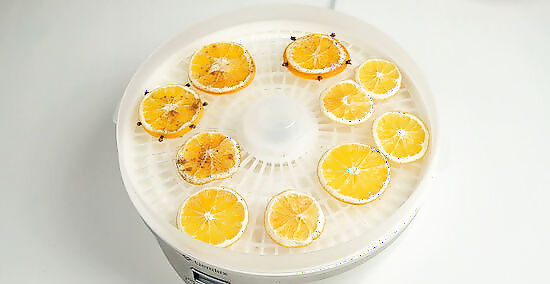
Follow your dehydrator’s instructions for the easiest drying method. Lay the orange slices on the rack of the dehydrator, following the fruit spacing guidance for your model. Set the drying time based on your unit’s instructions—it typically takes around 6 hours to dry 1 cm (0.39 in) orange slices. A food dehydrator takes longer than most drying methods, but it’s also the only “set it and forget it” option.

Lay the slices on a clean window screen for outdoor drying. If you want to dry your orange slices using only sunlight, lay them out on a framed mesh window screen. (Clean the screen thoroughly with soap and water, then let it dry fully, before using it!). Provide about 5 cm (2.0 in) of space between slices. If you plan to dry fruit regularly this way, buy a window screen solely for this purpose. Outdoor drying works best if you live in a warm, sunny, dry climate. Don’t expect it to work on a cloudy, humid day!
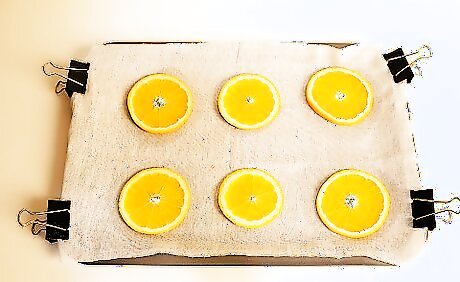
Prop up the window screen in a spot that gets full sunshine. Set the corners of the window screen on concrete blocks, for instance, or use something else that raises the screen at least 50 cm (20 in) off the ground. Choose a spot that gets full sunlight for at least 6 hours, and ideally 8 or more. The higher you prop up the screen, the more air flow the underside of the slices will get. This speeds up the drying process significantly. Propping the screen up also helps protect the orange slices from hungry animals!

Flip the slices every 30-45 minutes until they’re dry. Frequent turning is the key to even drying in the sunlight. Use tongs or your fingers to flip over every slice. When they feel completely dry, they’re done! The drying time will vary widely based on your environmental conditions. The slices may dry in as few as 2 hours, or as many as 8-10 hours.
















Comments
0 comment